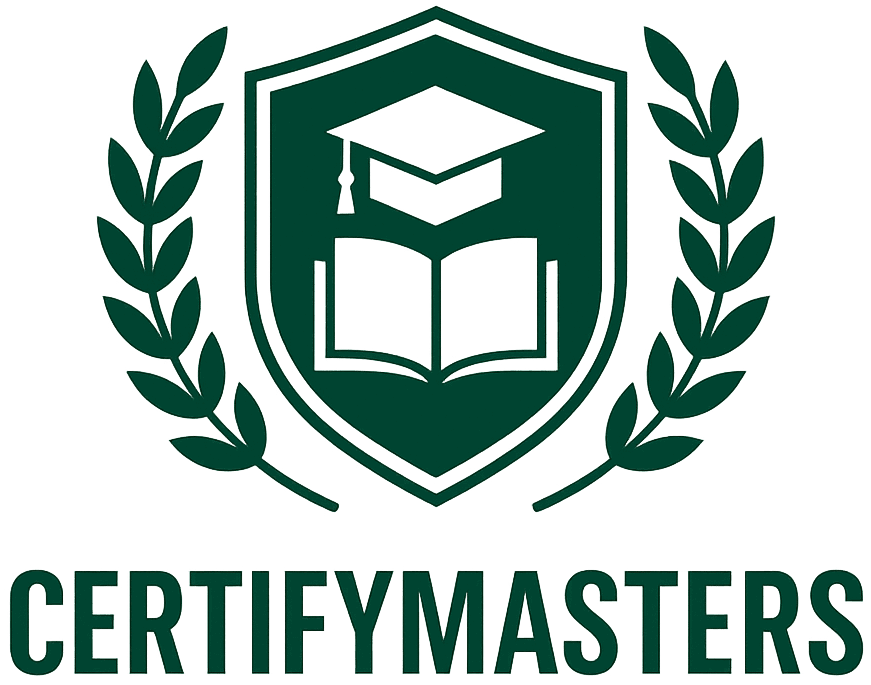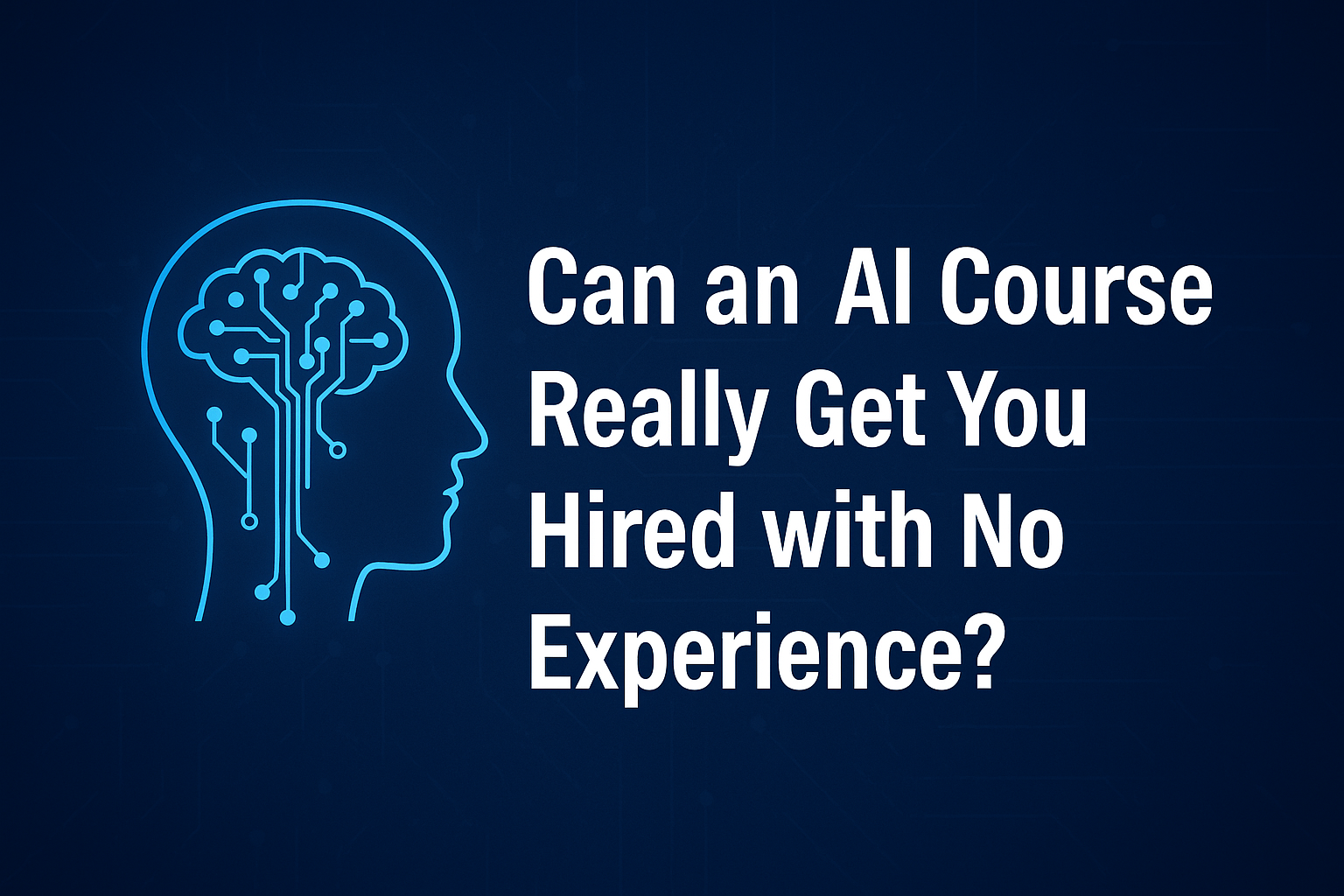Introduction: The Burning Question
Artificial Intelligence is reshaping the job market, but one question dominates Google searches: Can you land an AI job with no prior experience just by taking a course?
The short answer is a qualified yes. A course alone won’t guarantee you employment, but paired with a strong portfolio, practical projects, and smart networking, it can absolutely open doors to well-paid entry-level AI roles.
1. Why the AI Job Market Is Different
- Skills over degrees: Employers are shifting from valuing diplomas to valuing proof of skills. Portfolios are now “the new resume”
- High demand, skill gaps: 66% of hiring managers struggle to find AI talent, creating opportunities for beginners who demonstrate practical skills.
- New non-technical roles: Positions like Prompt Engineer and AI Content Reviewer don’t require deep coding, but they do require AI literacy.
2. The Role of AI Courses
AI courses and bootcamps are more than tutorials:
- Bootcamps & certifications → teach job-ready tools (Python, ML frameworks) and often include career coaching.
- University-backed certificates → carry extra weight with employers, bridging the gap between traditional degrees and short courses.
- Traditional degrees → still matter for advanced research roles, but they aren’t the only gateway anymore.
3. Why a Portfolio Matters More Than a Certificate
Employers don’t just want to know what you learned; they want to see what you built. A GitHub portfolio proves:
- Problem-solving ability beyond “tutorial projects”
- End-to-end execution with messy, real-world data
- Business impact through projects like Sentiment Analysis, Resume Screener, or Fake News Detection.
Pro tip: Document your projects on GitHub and Medium—this doubles as both a resume and a pre-interview technical screen.
4. Entry-Level AI Jobs You Can Get with No Experience
AI is no longer limited to PhDs. Some accessible roles include:
| Role | Key Skills | Accessibility | Avg. Salary (US) |
|---|---|---|---|
| Prompt Engineer | Linguistic intuition, prompt design | High | $120K+ |
| AI Content Reviewer | Writing, attention to detail | High | $60K–80K |
| Data Annotator | Labeling data sets | High | $40K–55K |
| Data Analyst | Python, SQL, stats | Medium | $65K–75K |
| ML Intern | Basic coding, debugging | Medium | Varies |
Source: [mygreatlearning.com] [blog.promptlayer.com] [ziprecruiter.com] [payscale.com]
5. The Five-Pillar Roadmap to Getting Hired
- Foundational skills – Python + core math (linear algebra, statistics).
- Portfolio projects – Build real-world, business-oriented applications.
- Practical experience – Contribute to open source, freelance, or intern.
- Networking – Engage on LinkedIn, Reddit, and AI meetups.
- Optimized job search – Project-focused resumes, portfolio links, clear storytelling
Top Recommended AI Courses for Beginners
1. AI For Everyone by DeepLearning.AI (Coursera)
A universally praised entry-level course by Andrew Ng, perfect for those with no technical background. It introduces AI concepts, societal implications, and business applications—no coding or math required.
- Rated ~4.8 from 50K+ reviews Coursera+1 learndatasci.com.
2. Introduction to Artificial Intelligence (IBM) (Coursera)
A well-structured, beginner-friendly course that covers AI fundamentals along with practical use cases. Ideal for building conceptual understanding quickly.
- Offers 1–4 weeks duration and positive reviews on Coursera Coursera.
3. Introduction to AI (Google, Coursera)
Another excellent beginner offering that covers generative AI, machine learning basics, and critical-thinking frameworks—backed by Google’s authority.
- Rated ~4.9 from 5K reviews Coursera+1.
4. Elements of AI (University of Helsinki + MinnaLearn)
A fully free MOOC focusing on AI fundamentals, machine learning, and the ethical dimensions of AI. Great for budget-conscious learners seeking a solid theoretical foundation.
- Designed for wide global access and well-regarded in Europe elementsofai.com Wikipedia.
5. Practical Deep Learning for Coders (fast.ai)
Once you’re comfortable with Python, this free, project-driven course teaches deep learning through hands-on coding (CNNs, RNNs, GANs). It’s rigorous but highly practical.
- No formal certificate needed, but excellent for building a GitHub portfolio Wikipedia.
6. CS50’s Introduction to AI with Python (Harvard)
Harvard’s AI introduction focused on using Python to build simple ML models. Structured over ~7 weeks—great for learners who want a structured, university-level experience.
- Rated as a solid foundational course Harvard University.
Conclusion: The Verdict
So, can an AI course alone get you hired with no experience? Not by itself. But as the launchpad to a portfolio, real-world projects, and strategic networking, it can absolutely lead to high-growth AI roles even for complete beginners.
In today’s skills-driven market, execution beats education. The candidate who shows, not tells, will always win.
Sources & Further Reading
- OpenAI Gets Into Recruiting While the Job Market Struggles to Reinvent Itself – Josh Bersin
- Tech Hiring in 2024: Demand for IT Talent in the US – Tunga
- Hiring Guide: No Experience Artificial Intelligence – ZipRecruiter
- The Rise of Skill-Based Hiring: Why Certifications Matter More Than Degrees – Apollo Technical
- The Truth About AI in Job Interviews (Video) – YouTube
- How to Become an AI Engineer from Scratch – Zero to Mastery
- How to Build a Beginner-Friendly AI Portfolio – AI Mind
- 2025 Roadmap: How to Become an AI Engineer (No Degree Needed!) – Medium
- Trending Online Courses in 2025 – upGrad
- The Best AI Bootcamps in 2025 – TripleTen
- From Learning to Landing: A Bootcamp Helped Me Get Hired – Medium
- How She Became a Machine Learning Engineer Without a CS Degree (Video) – YouTube
- Coding Bootcamp vs. Computer Science Degree – TheBestSchools.org
- No CS Degree? Here’s How I Broke Into AI and Got Hired – Medium
- Do You Need a Master’s or PhD to Work in AI? – edX
- Is an AI Graduate Certificate Worth It? – University of Cincinnati
- Is an AI Certification Valuable for My Career? – UTSA
- AI Project Ideas for Beginners – TalentSprint
- AI Prompt Engineering Jobs in 2025: Skills, Salaries & Outlook – PromptLayer
- How to Become a Prompt Engineer – Great Learning
- Entry-Level AI Jobs for Non-Tech Professionals – Upwork
- AI Content Reviewer Job Listing – MCI Careers
- Entry-Level AI Jobs: Launching Your Career – Coursera
- Self-Taught ML Engineers: How Did You Land a Job? – Reddit
- Getting a Job in AI Without a Degree – Tallo
- What Is an AI Engineer (and How to Become One)? – Coursera

